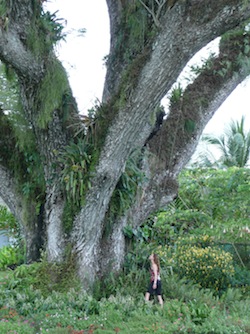
~ Wendell Berry, "The Peace of Wild Things"
We at NoVo Foundation honor the memory of one of the most inspiring and wise women I have ever met, Wangari Maathai. With great sadness, we learned that this courageous, visionary woman passed away on Sunday. She was one of those rare and amazing leaders who embodied deep integrity, courage, and wisdom. She had an inner light and a deep knowledge about the power of truth, the goodness of women, the need for individual responsibility, and the importance of connectedness.
I had the pleasure of sharing time with Wangari before the NoVo Foundation was born. In 2005, Wangari (accompanied by her daughter Wanjira) graciously agreed to speak to an audience after a Philadelphia performance of "Spirit - the Seventh Fire," a theatrical show my husband Peter produced. The show was inspired by an Ojibwe prophecy about a period of healing called the Seventh Fire, during which people will look to their ancestors in search of new ways to live in harmony. We are those people at that crossroads; will we remember our humanity and connectedness in time to usher in a new era of peace? Or will we be driven onto a darker path by control and greed?
Wangari was perfectly suited to speak after that show. She had been helping the world answer this very question for a long time. She had passed through this crossroads when I was still a child, and had been planting the road to the Eighth Fire -- the period of peace and harmony -- with millions of saplings ever since.
When it came time to formally define our focus and mission at NoVo, she was one of those who inspired us to realize that we could also help the world toward the Eighth Fire by supporting girls and women as primary agents of change. Eventually we had the honor of supporting Wangari and her work.
Wangari's uniqueness as a leader sprang from her dedication to hearing the often-disregarded voices of women. She was herself a phenomenally accomplished woman, the first in east or central Africa to earn a PhD, chair a university department, or become a professor, and the first African woman to win the Nobel Peace Prize. But as a representative of the National Council of Women of Kenya, she did not insert her ideas about what she thought they needed. Instead, she listened when the rural women she spoke to said they lacked firewood, clean water, and good food. If those were their needs, she suggested, perhaps trees would provide.
It was a sensible and humble idea, and the beginning of something monumental. It was the beginning of a rediscovery: that our natural surroundings could and should provide for our families and our communities. And that the sense of security provided by an abundant landscape can be an antidote to violence, oppression, and exploitation. That we are a part of the web of life and suffer when the delicate balance is broken.
Women responded passionately to Wangari's suggestion, planting trees with a zeal that suggested these saplings expressed some yearning deeper than the hunger for food. In formally establishing the Green Belt Movement in 1977, Wangari was wise enough to see that for the disempowered, planting trees was in fact a radical act of self-assertion, a method of laying claim to the life-giving power of one small corner of the Earth. In the decades that followed, not only did Wangari mobilize hundreds of thousands of women and men to plant 47 million trees, but she captured the fervent and optimistic spirit of the movement to lead a series of protests and other episodes of civil disobedience that led to real change.
Beginning with that small gesture of empowerment -- the planting of a single tree -- Wangari's followers delivered a rebuke to corrupt and oppressive leaders whose pursuit of power and riches make them indifferent to the starvation and ill-health of their own people. The great power of her vision was evident in the push-back that Wangari received. Why else should anyone mind if a simple woman from Kenya was planting trees to resurrect the water supplies, wildlife, and ecosystems that could then support the health and well-being of women and families? She understood that women, working as powerful actors in their local contexts, can change the world. But women -- and men -- followed her because she was a visionary human leader. Indeed, she showed us that the connections that bind people to each other and to nature are the most transformative forces on earth. What we knew as children -- a longing for re-connection to the web of life -- can guide us to the future. The most profound expression of Wangari's simple message was in the leaves of humble growing things.